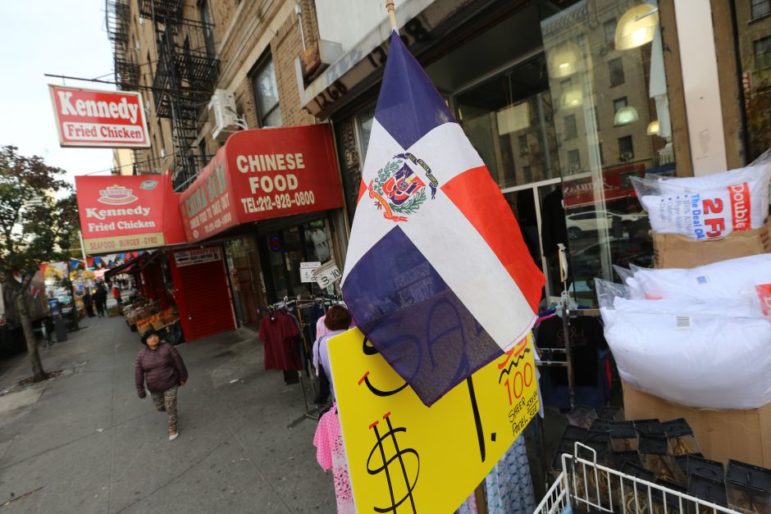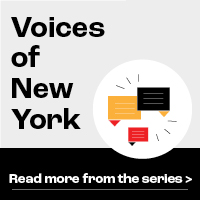
(El Diario/Fernando Martínez)
Dominicans living in New York are following the country’s political situation closely, El Diario reports. (El Diario/Fernando Martínez)Read the original story in Spanish at El Diario
Translated and condensed by Carlos Rodríguez Martorell
Since she moved to New York in 1974, Altagracia Collado, a school assistant living in Upper Manhattan, has never lost track of the political dealings in her native Dominican Republic. Like many others interviewed in the streets of Washington Heights by El Diario, Collado said that the island’s recent electoral disaster is “a global embarrassment” to which the thousands of Dominicans living in New York City are not indifferent.
On February 16, the Dominican Central Election Board (Junta Central Electoral, or JCE) suspended the island’s municipal election due to technical failure, unleashing a political hurricane that has resulted in protests and injured demonstrators. Its winds have begun to reach New York, where an estimated 200,000 Dominicans would be eligible to cast their ballot on the upcoming presidential election scheduled for May.
“Dominicans abroad could decide an election in our country, which is why we have to mobilize and demand that the sacred democratic right to vote is respected,” said Luis Rodríguez-Radamés, a member of the New York committee of the Alianza País political alliance.
The opposition coalition, formed by over 25 parties, is running against the ruling Dominican Liberation Party (Partido de Liberación Dominicana, or PLD,) and accuses it of carrying out fraudulent schemes as the Caribbean country launched its new automated voting system.
Powered by new technology, the voting session came to a halt after four hours in the midst of a technical chaos that forced the JCE to suspend the electoral process, partly because not all political parties appeared on the electronic ballots. The vote was rescheduled for March 15 and will be held manually.
“Any Dominican who feels for their country and lives abroad needs to mobilize against this affront to democracy. The PLD articulated a controlled fraud. They have governed for many years and are maneuvering to stay in power,” said Rodríguez.
For their part, New York representatives of the Modern Revolutionary Party (Partido Revolucionario Moderno, or PRM,) the lead opposition party, insisted on local media that the ruling party aims to eliminate the vote of Dominicans abroad.
Alejandro “Tontón” Rodríguez, leader of the PRM in New York, said that the postponement of Sunday’s municipal vote can be described as “fraud,” and urged the election board to discard the “disastrous idea” to restrict the right to vote for Dominicans living out of the country.
“Our population abroad is classified as the ninth province of the country due to its density and its importance to the economic development of the Dominican Republic. That is why they cannot be deprived of their right to elect their president and legislative representatives,” said the political leader.
As she shopped on St. Nicholas Avenue in Upper Manhattan, Luisa Ramos, 45, said she had just returned from a trip to Santo Domingo and that it pained her to see that, politically, “everything is a disaster.”
“I used to always vote for the PLD, but now I have no idea. You get disappointed to see that years go by and things stay the same. I am even thinking about not voting at all. They are all the same,” she said.
Cibao-born merchant Miguel Chico-Salazar, 65, has no doubt that all “the fuss” is due to a “]”powerless opposition,” whom he accuses of sabotaging the election.
“If you go to the island, you can see that there is some progress. The PLD will continue to govern even if [the opposition] tries to change what the majority thinks with their tricks. Vote manually, vote with machines, vote on little pieces of papers, we are always going to win,” said Chico-Salazar, who lives in Upper Manhattan. He added that he would fly to the island with his entire family to vote if he was unable to do so in New York.
Others have a different opinion. Altagracia Collado, who was born in La Vega, said that for the past 45 years her “heart has been on the island.” She added that “the Dominican Republic needs a change. There is no education, no well being. This chaos infuriates me. They can’t even do an election well.”
Francisco Fernández, a member of the PLD’s central committee in New York, links the electoral disaster to “shady hands and the opposition’s desire to manipulate the process.”
“In the end, the parties opposing the government are the ones who have benefited the most from the suspension. I have no doubt that former President Leonel Fernández, who ruled for 12 years and knows the system very well, is behind all this,” said Fernández, adding that the Dominican community in New York has great influence on the island’s electoral processes.
“Political activism here is extremely strong, and all these gaps in the process will serve to strengthen our democracy. For the first time, we have a political parties law. Obviously, the problems with the automated system do not mean that we need to return to the analog system,” he said.









